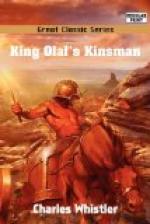Now my father lies resting among nameless heroes who died for England on Nacton Heath—I know not even which of the great mounds it may be that holds his bones—but he fell before the flight began when Thurketyl Mirehead played the craven. Neither victor nor vanquished was he when his end came, but maybe that is the best end for a warrior after all. Some must fall, and some may live to boast, and some remain to mourn, but to give life for fatherland in hottest strife is good. That is what my father would have wished for himself, and I at least sorrow but for myself and not for him.
Now I have spoken of remembrance, and I will add this word—that some things in a man’s life can never be set aside from his memory. Waking or sleeping they come back to him. Eight days after that going of my father came such a time to me, so that every least thing is clear to me today as then.
I sat plaiting a leash for my hounds on the settle before the fire in our great hall at Bures, and I remember how the strands of leather thong fell in my hand; I remember how my mother’s spinning wheel stopped short with a snapping of broken threads; how the thrall who was feeding the fire stayed with the log in his hands; how the sleepy men at the lower end of the hall sprang up with heavy words checked on their lips before the lady’s presence; how the maidens screamed—aye, and how the draught swayed the wall hangings, and sent a long train of sparks flying from a half-dead torch, as the great door was thrown open and a man flung himself into our midst, mud splashed and white faced, with hands that quivered towards us as he cried hoarsely:
“In haste, mistress—you must fly—the Danes—” and fell like a log at my mother’s feet where she sat on the dais, neither moving nor speaking more.
It was Grinkel, the leader of our housecarles {1}. His armour was rent and gashed, and no sword was in the scabbard at his side, and his helm was gone, and now as he fell a bandage slipped from his arm, and slowly the red stream from a great wound ran among the sweet sedges wherewith the floor was strewn.
There came a mist before my eyes, and my heart beat thick and fast as I saw him; but my mother rose up neither screaming nor growing faint, though through her mind, as through mine, must have glanced the knowledge of all that this homecoming of brave Grinkel meant. She stepped from the high place to the warrior’s side and hastily rebound the wound, telling the maidens meanwhile to bring wine that she might revive him if he were not already sped.
Then she rose up while the old steward took the wine and tried to force it between the close-set teeth, and she called the farm servants to her.
“Make ready all the horses and yoke the oxen to the wains,” she said in a clear voice that would not tremble. “Send the lads to warn the village folk to fly beyond the river. For Grinkel comes not in this wise for nought. The Danes are on us.”




